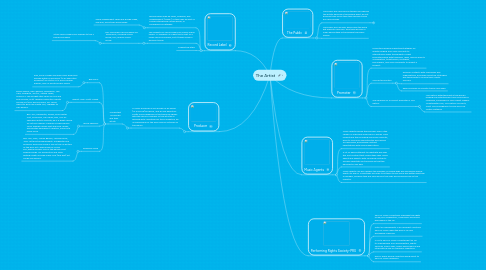
1. Record Label
1.1. Record labels may be small, localised, and "independent" ("indie"), or they may be part of a large international media group, or somewhere in between.
1.1.1. Some independent labels are Rough Trade, Sub pop, and Stolen Recordings.
1.2. The largest four record labels are called "major labels". A "sublabel" is a label that is part of a larger record company, but it trades under a different name.
1.2.1. The 4 big major record labels are Song BMG, Universal Music Group, EMI, Warner Music Group.
1.2.1.1. Other record labels also subside to the 4 big record labels.
1.3. Supporting Staff
2. Producer
2.1. A music producer is also known as an album (or a record) producer, and his job definition pretty much depends on the terms he agrees with the record company or the artist he is working with. Whatever his terms might be, he is responsible for the final musical outcome of the album.
2.1.1. 4 important producers and their artists
2.1.1.1. Bob Ezrin
2.1.1.1.1. Kiss, Alice Cooper and Pink Floyd: Bob Ezrin worked either as producer (or as executive producer) on a total of 12 Alice Cooper albums, and co-wrote several songs.
2.1.1.2. Robert John “Mutt” Lange
2.1.1.2.1. Bryan Adams, Def Leppard, Nickelback, The Cars, Foreigner, AC/DC, Shania Twain, Maroon 5: The sought after name of rock and pop records, Mutt Lange’s production credits include AC/DC’s Back in Black, For Those About to Rock We Salute You, Highway to Hell albums.
2.1.1.3. Bruce Fairbairn
2.1.1.3.1. Bon Jovi, Aerosmith, Poison, Blue Oyster Cult, Scorpions, Van Halen, Kiss, Yes: As Fairbairn’s artists indicate, he is a great choice for hit rock albums. Fairbairn produced Bon Jovi’s Slippery When Wet and New Jersey, Aerosmith’s Permanent Vacation, Pump and many more.
2.1.1.4. Desmond Child
2.1.1.4.1. Bon Jovi, Cher, Jimmy Barnes, Jennifer Rush, Joan Jett and the Blackhearts: Songwriter and producer Desmond Child is one of the co-writers of the KISS hit “I was made for loving you”,which remains one of the band’s most popular songs. His production and song writing credits include many rock (and pop) hit songs and albums.
3. The Public
3.1. The public are very big contenders for helping the artists because if the people didn't go out and buy their music then they wouldn't have any record sales.
3.1.1. Materials
3.1.2. Personel
3.1.3. Services
3.1.4. Duration
3.2. The public also go gigs, which help the band get publicity and fans. Also they will earn a small percentage of the people the public spend.
4. Promoter
4.1. Promoters develop marketing strategies for events ranging from rock concerts to international chess tournaments. Event promoters work with television, radio, special-events coordinators, ticket sellers, reviewers, bulk mailers, and local merchants to market a product.
4.2. Concert promoters
4.2.1. Develop contacts with individuals and organisations, and apply effective strategies and techniques to ensure their clients' success.
4.2.2. Keep informed of industry trends and deals.
4.3. One example of a concert promoter is Live Nation
4.3.1. Live Nation Entertainment is the world's leading live entertainment and eCommerce company, comprised of four market leaders: Ticketmaster.com, Live Nation Concerts, Front Line Management Group and Live Nation Network.
